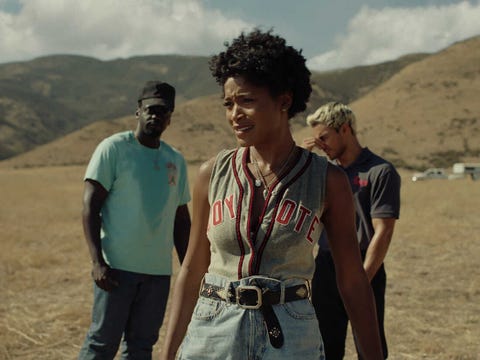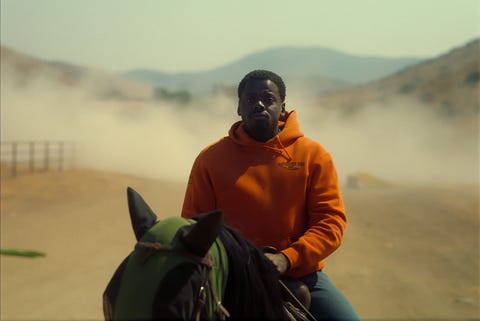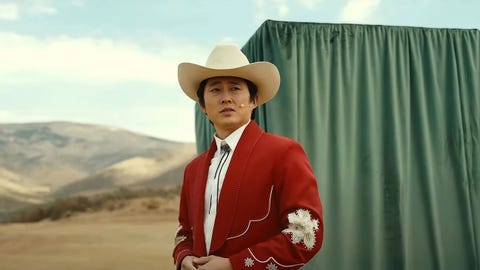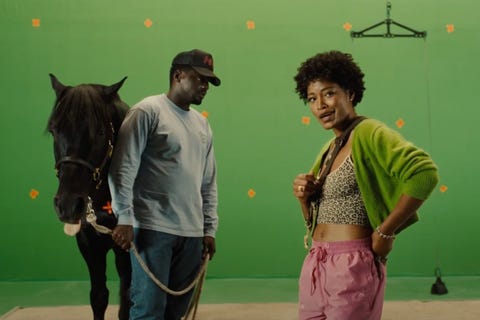The following story contains heavy spoilers for Jordan Peele’s 2022 film, Nope. Read on at your own discretion.
There are a lot of good reasons why Jordan Peele is universally known as one of the greatest new filmmakers of the last decade—and one of the best working, period. But perhaps above all, he’s now 3/3 on movies that as soon as the credits start to roll, there’s one thing you want to do: talk to somebody—anybody—about it. It was the case with his first film, the Academy Award-winning Get Out, it was his case with the somewhat-more-divisive follow-up Us, and it’s already proven to be the case with his different-but-still-oh-so-complex third feature film, Nope. And you better believe that we’re ready, willing, and excited to talk about it too.
At its core, Nope is an alien movie. If you want it to be, it can just be that simple. It’s clear as day Peele, after crafting a couple stories that reveled in smaller-scale, interpersonal tension, wanted to make something that went bigger; think of Nope as his version of Jaws in the sky, complete with a duo of high and low energy that balances each other out leading the way (Daniel Kaluuya and Keke Palmer are our new version of Roy Scheider and Richard Dreyfuss). We’ve even get an outsider who joins the party (Michael Wincott’s deep-voiced cinematographer Antlers Holst is a clear nod to the cryptic sea legs of Jaws’ Quint) just to make it clear that our heroes aren’t crazy—this is a big deal.
If you just want to watch Nope for the Spielberg-ian spectacle of it all (and be my guest if that’s your jam), you’ll still come away quite pleased. But this is a Jordan Peele movie, and while you’re getting something new from him just on the surface level—blockbuster-level horror and spectacle—there’s far more happening just a bit beneath the surface. And that spectacle is what unlocks the film’s mysteries.
The very key to understanding Nope comes from something that Peele himself has made abundantly clear during the press tour in the lead-up to his movie’s release; we’re addicted to spectacle, to the point where many of us are willing to overlook warning signs that may come as part of the package. “I was inspired by films like King Kong and Jurassic Park that really deal with the human addiction to spectacle and the presentation and monetization of that,” he told the Associated Press. Those are also movies with fascinating spectacles at their core, visual feasts that, you guessed it, end poorly. And it’s ultimately a reflection on our greed. We see something spectacular, and we want to exploit it. Any warning signs along the way can be either misinterpreted or dismissed—because the warm glow of the dollar can be too enticing.
I’d like to say up front that at this time I’ve only seen Nope once; Peele’s films being foreshadowing treasure troves upon rewatch is almost his trademark. I plan on seeing this movie several more times in the near future—there’s probably enough to take away something new and different every single time.
But for now, this is what the centerpiece of Nope is—and how the seemingly-tangential storyline of Ricky “Jupe” Park (played wonderfully as an adult by Steven Yeun) is the key to unlocking the whole film.
So, what was the deal with that Gordy’s Home! scene in Nope?
If you thought the Gordy’s Home! plot in Nope was tangential or unrelated to the overarching story of a UFO/Alien sharing space with the Haywood Hollywood Horses Ranch, well, you’ve got quite a lot to observe on an inevitable rewatch of the movie.
Peele opens the movie with scenes of the sitcom, ensuring the audience that this will be important for whatever is to come. That sitcom comes into play once our main characters, OJ (Kaluuya) and Em (Palmer), come in contact with Jupe. Jupe owns a Western-themed park, for which he has been buying horses from OJ in what’s been a mutually beneficial working relationship. Jupe needs horses for his park (for reasons we find out more detail on later), and OJ needs to keep his family’s ranch afloat in the aftermath of his father, Otis Sr.’s, sudden death.
But during their meeting, Em notices a MAD Magazine on Jupe’s wall in his office, and we get our first taste of the story at the film’s center. Jupe is famous for his role in an Indiana Jones type of movie called Kid Sheriff, but lives in infamy following an incident in which a show he starred on, Gordy’s Home!, saw his monkey co-star go ballistic on the set. Present-day Jupe pays tribute to this moment with a shrine that he makes sure to note that he usually charges people to see; a brief glimpse to young Jupe shows him hiding under a table in fear, with blood, screams, and general mayhem all around him.
The juxtaposition between this flashback and the novelty with which adult Jupe seems to remember things is stark; we later see a full scene of legitimate small massacre, but the adult version of this shellshocked child can only recount it through referencing an SNL sketch starring Chris Kattan. He’s numbed himself to the pain of the memory; it’s now only a source of clout and income.
The flashback features a moment where the connection between the Gordy’s Home! stars are seemingly put to the test, as Gordy, fresh off attacking Jupe’s TV Dad, approaches the young boy. In one of the most tense film moments of recent memory, Gordy comes over and looks at Jupe through a translucent tablecloth; instead of attacking, he offers his hand through the cloth (also obscuring eye contact) for a fist bump, just like a framed image in adult Jupe’s office depicted. Was the connection real? Jupe sure left that moment thinking so. Before he can even form a thought in the moment, Gordy’s head is then blown off by some authority—but the damage has been done.
This content is imported from Twitter. You may be able to find the same content in another format, or you may be able to find more information, at their web site.
This would be an impossible experience for anyone to walk away from unscathed, but especially for a child actor who—through starring in movies and television—was likely already being somewhat-exploited himself. If Jupe’s takeaway from this experience was that he should be counting his blessings and thankful that he was afforded a fate different from his costars, he clearly took it the wrong way; just in the same way that the show he was on was exploiting both him—a child star from a major hit movie—and a gifted monkey—Gordy!—he’s now the one exploiting that truly disturbing and troubling experience for profit. And that pattern doesn’t end there.
Jupe became trapped in a prison of his own creation—and his own expectations.
As the movie continues, we learn that OJ and Em aren’t the only ones who have been seeing the UFO—later dubbed Jean Jacket—in the sky. For six months, Jupe has been putting on a show called “Star Lasso,” setting horses out as bait for the mysterious being in the sky. And it becomes clear in this moment that Jupe hasn’t been counting his blessings for simply being alive, but rather that he’s taken his experience on the Gordy’s Home! set and developed a God complex.
The key, later in the movie, to not getting eaten by Jean Jacket, is by not looking at it. This is the same key that OJ presents early in the film on the commercial set to keeping Lucky the horse calm; it’s possible that the same key, thanks to the tablecloth, helped to spared young Jupe from Gordy’s rampage by obscuring their eye contact. But Jupe misreading led down a dangerous path of self-importance: the false belief that Gordy spared him because of some kind of special connection rather than a random happening. If he survived that—and lived to make a buck off it—than surely he could survive an alien situation.
He’s special. Or, at least, he convinced himself he was.
The Gordy’s Home! scenes take place in 1998, and it’s clear that in the 24 years that followed, Jupe convinced himself, over and over again, that there was only one reason why he survived that encounter: because he was special. He was special enough to star in a movie; he was special enough to star in a show; he was special enough to survive a violent, heinous, animal attack; he was special enough to create a shrine to that moment and charge people to see it. So he must be special enough to tame some aliens for his own profit too.
Jupe told himself that he was special, and, in the end, he overlooked the mundanities that led him to where he was. He was only in that movie, and on that show, because other forces (likely his parents) guided him there. He survived (most likely) because of some combination of the tablecloth separating his line of sight from Gordy’s and sheer random happenstance. But in his mind, he already made it through the worst. But the reality was that he was no different from anyone else; just another guy chasing a dollar.
Peele mentioned during the Nope press tour that his original working title for Nope was Little Green Men; in other words, the faces on our paper currency.Sure, there’s an alien in Nope, but the person responsible for the most deaths on screen is the guy who dragged an audience to show off something that he never had control over—Jupe, his family, and his audience of at least 40 people are all sucked into Jean Jacket’s alien stomach—in pursuit of those little green men.
What about the shoe standing upright on the Gordy’s Home! set?
During the Gordy’s Home! flashback scene, one moment in particular is uncanny: as Jupe hides under the table, we see Gordy absolutely mauling Mary Jo Elliott, his co-star on the sitcom (who the present-day timeline reveals is still alive, though with extreme facial scarring) but just off to her left, her shoe is off her foot and standing upright. This comes back to something that was discussed earlier in the movie by OJ and Em: a “bad miracle.”
The death of their father, Otis Sr., was the inciting event to the whole movie; it was called a “bad miracle” because whatever was flying through the air, whether it was coming from a UFO or some unknown phenomenon, was truly miraculous. A 1 in a million happening. But it led to a quarter flying directly into Otis Sr.’s eye cavity, resulting in his death, and a traumatizing experience for OJ. A bad miracle. And one with an explanation that that OJ never accepted—he displays the quarter that took his father’s life on his wall as a reminder that something is wrong.
You could make the case that the Gordy’s Home! scene had not one, but two bad miracles: Jupe’s survival of an event that altered tons of lives, possibly due to hiding in the one spot on the set where he could avoid eye contact. And the shoe standing upright—Mary Jo getting ravaged led to another 1 in a million outcome: the shoe standing upright on its own. It’s a miracle, but not through the circumstances that anyone ever wanted to see.
In Nope, Peele is obsessed with that idea of spectacle. In stating King Kong and Jurassic Park as references, those are two clear as day texts about the idea of attempting to tame untamable beasts; film director Carl Denham thinks he can play god and use King Kong for his own profit. Scientist John Hammond thinks he can create dinosaurs and use them as his own plaything. And child actor and western theme park owner Ricky “Jupe” Park, through surviving an encounter with one beast, thinks it’s his destiny to survive another.
Peele has other ideas, and he wants it to be abundantly clear: that destiny does not exist.
This content is created and maintained by a third party, and imported onto this page to help users provide their email addresses. You may be able to find more information about this and similar content at piano.io






Comments are closed.